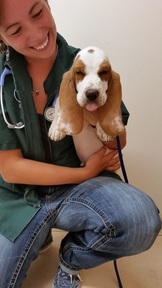
I lead with that to say that sometimes, we're clients too. We understand first-hand that money is tight and Veterinary care can be expensive. We want the best for your pets and ours, and that means providing the safest anesthesia, staying current on medications and treatments, constantly taking Continuing Education to stay up on new diseases or diagnostics, and treating your pet as if it was our own. When I look at my farm bill, one of the most foggy charges is the "Farm Visit," or in our case, the "Office Visit." Everything else is listed in detail - drugs, route given (injectable, oral, etc), x-rays, blood work...but not the "Farm Visit." It's often the most expensive part of the whole day!
So, what is an "Office Visit?"
In short, the office visit covers the Doctor's time to examine your pet, discuss your questions and if needed, make a plan moving forward for diagnostics or treatment.
In detail, the exam covers:
1. Mental attitude - is your pet aware and bright? Or is your pet more subdued than usual, or less responsive than normal?
2. Body Condition Score - is your pet thinner than before? Were you trying to help him lose weight or has this slowly happened despite no changes at home? Is your pet getting dangerously heavy?
3. Coat quality - sometimes changes in coat can indicate underlying diseases such as kidney disease, thyroid disease, adrenal disease or diabetes.
4. Heart and lungs - is there a new heart murmur or arrhythmia present? Has an old murmur changed? Do the lungs sound normal, or are there changes?
5. Eyes, ears, nose and throat - we spend a lot of time here. We look at the back of the eyes to make sure the retina looks normal (no evidence of high blood pressure, cancer, vision loss), we make sure the lens looks normal (no cataracts or old age changes) and we look for corneal changes that could make your pet uncomfortable. We check ears for infection, debris or inflammation. We look in the mouth for dental disease, and to make sure there aren't any oral tumors. We check to make sure both nostrils have even air flow and that the nose appears normal, since we see a lot of autoimmune disease that attacks the nose first.
6. Abdomen - is the abdomen relaxed and not painful? Are there any organs that feel larger or smaller than normal, or any tumors?
7. Lymph nodes - do any lymph nodes feel large or hard? This can indicate an infection somewhere, or the early stages of lymphoma.
8. Musculoskeletal - is your dog "slowing down" with age, or is your dog slowing down because his joints hurt? We check range of motion and palpate joints and bones to make sure pain isn't a daily part of your pet's day.
9. Urogenital - is your pet urinating and defecating normally? If not, why? This part of the exam (sometimes including a rectal examination) evaluates these systems for abnormalities such as tumors or infection.
10. Integument (skin) - Does your pet have any areas of thinning hair or dandruff? Sometimes this can be an early sign of an underlying hormonal issue.
11. Behavior - is your pet pacing at night? Having accidents in the house? Afraid of the vacuum? Destructive when you leave him alone? Are you having a new baby and worried your pet won't adjust? These are all things we're here to help with!
After we've done a full exam ("Office Visit"), we may recommend diagnostics such as blood work or x-rays to get more information about a problem and to plan treatment. We're always happy to provide an estimate for the cost of these, and to help you choose the best path for your family.
Though expensive, my most recent "Farm Visit" found a problem in my horse's mouth, treated it and made her as good as new! We love helping your pets have the same experience, so please, don't hesitate to ask us about any aspect of your visit! We're happy to answer questions and work with you to take care of your furry family member.
 RSS Feed
RSS Feed
